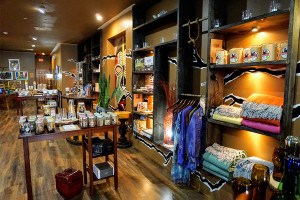How Senior Living Communities Are Coping With COVID
Apartment complexes for the 55-plus set seek to foster community and social interaction. So how are they managing to keep that going when the community facilities are off limits?
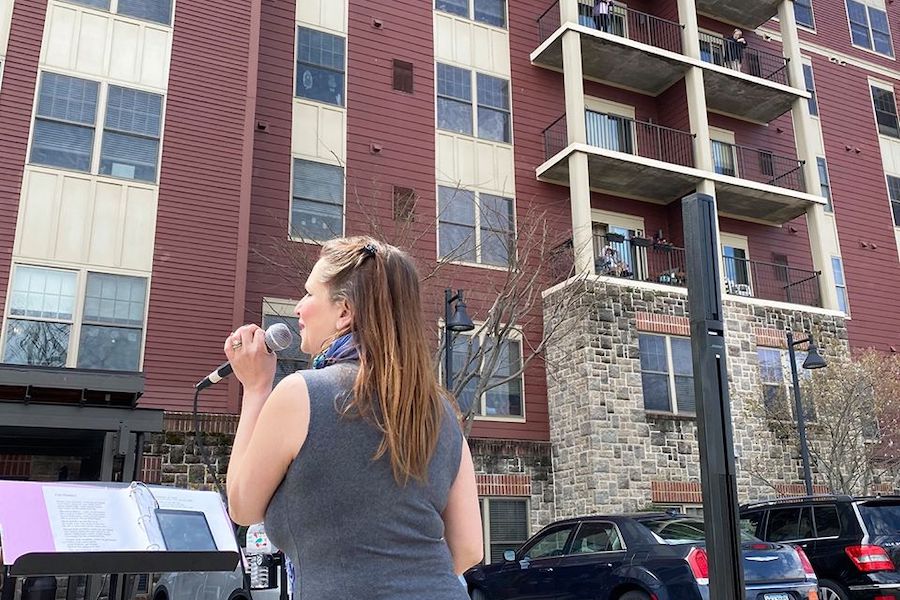
A singer delivers a parking-lot performance for residents of Sage Life’s Plush Mills senior-living community in Wallingford, giving every audience member their own private “box seat” for the concert. | Photos courtesy Sage Life unless otherwise noted
As anyone who hasn’t lived under a rock since mid-March should know by now, adults 60 and over face a greater risk of not making it to the other side of a COVID-19 coronavirus infection. A recent USA Today investigation found that more than 16,000 residents and staff nationwide have died of the COVID disease in nursing homes and long-term care facilities, a figure that represents about one-quarter of all the coronavirus deaths in the country.
Long-term care facilities also exist at many of the active-adult living communities for those 55 and older, but the bulk of their residents can live independently and are in better health. Nonetheless, they too face a higher risk of complications should they contract the virus.
The need to keep their residents safe makes one of the primary purposes of senior living communities harder to fulfill: that of fostering community and social interaction among residents. Community dining facilities, theaters, arts and crafts rooms, and programmed group activities all serve these ends, and none of them can be used or take place at present.
So how are this region’s senior living communities keeping their residents engaged and connected while they’re largely confined to their apartments? We asked managers at several local communities that question. Here’s what they told us:
Meals have become delivery affairs. With dinner in the dining room or bistro out of the question, residents at these communities now enjoy something associated with hotels: Room service.
“We’re doing mostly room service for all our meals,” explains Donna Ferruzzi, marketing manager for Sage Life, which operates four senior living communities in the suburbs. As with hotel room service, residents order entrees, side dishes and desserts from the restaurant menu and get them delivered to their apartments.
At the Watermark at Logan Square in the city, room service comes with a side of sociability. “Residents have a choice of menus with cuisine being brought room-service style to residents’ apartments, accompanied by friendly wellness check-ins, flowers, special treats and inspirational notes of cheer,” says Watermark at Logan Square Executive Director Steven Stefanelli.
Michelle Gittings, community relations director at Blue Harbor’s The Summit at Glen Mills in Chester Heights, says they too have gone the room-service route, but they have added a special bonus for residents who like to cook themselves: “Our chef, who gets his supplies from restaurant sources, has been going door-to-door taking orders for groceries from residents. Independent-living residents place their [ingredient] orders with him. He contacts his sources, and they will supply them and deliver them to us.”
Gittings says residents love this service, but not just the residents love it. “I’ve ordered some things from him because I was working and couldn’t get out to order groceries,” she says. “I served the food I got to my family and they raved about it.
“Instead of having the staff go to the grocery store, we can have our vendors deliver the goods to us and we can drop them off at the resident’s door. It’s very convenient, and it’s a nice perk for the staff too, because they spend so many hours delivering care now, they can’t get to the market either.”
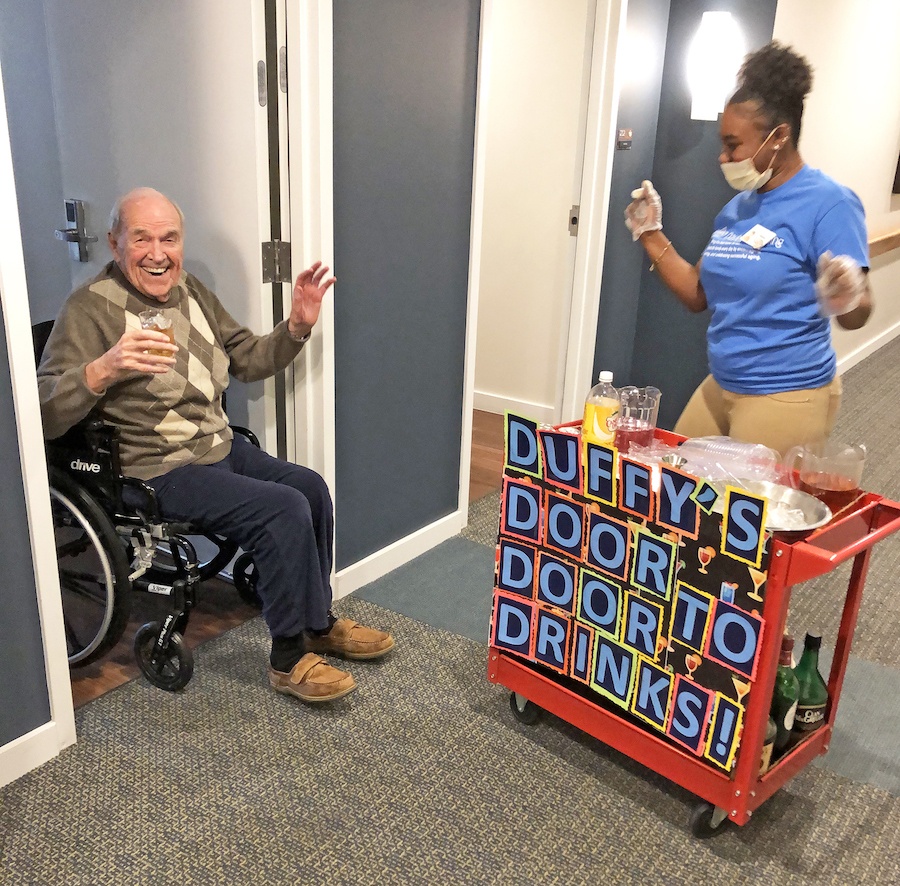
Daylesford Crossing staff member Brianna Northern fixes a cocktail for resident Bob Bergen at the complex’s “Duffy’s Door-to-Door Drinks” happy hour. The community sits where the popular Jimmy Duffy & Sons pub once stood, and its pub bears the name of the former establishment.
Social hours have gone anti-social, so to speak. Several local communities sponsor weekly happy hours for their residents. But instead of the residents going to the bar, the bar is coming to them.
“Even our happy hour has gone door-to-door,” says Ferruzzi. Staff wheel bar carts from door to door and mix drinks for residents who want them. It’s sort of like flying, only with lots more legroom and actual bartenders.
The Summit has held “Ice Cream Anti-Socials” for its residents, with ice cream carts serving desserts at residents’ doors, and at Sage Life’s Plush Mills development, the “Sundaes on Sunday” ice-cream social has likewise gone mobile.
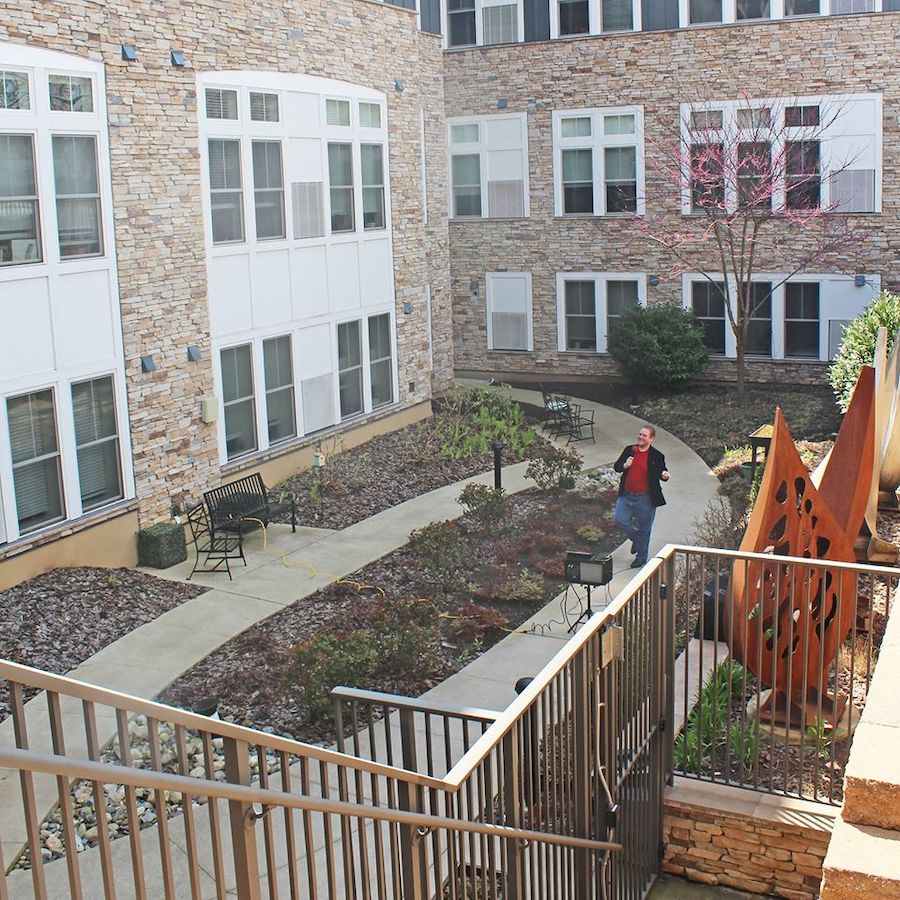
At Daylesford Crossing, the singer set up his first set in the complex’s sculpture garden.
Activities on your screen, in the hall, or even outside your window. One of the bigger challenges these communities face is in running the activities, events, and classes that keep residents active and engaged with one another, community staff and the community at large.
“While outings and group events have been suspended for some time out of caution and safety, our life engagement team is providing programs to engage residents as individuals and couples in their residences to have fun, learn and stay fit while observing safe social distancing guidelines,” Watermark’s Stefanelli says in an emailed statement. In addition to programs-on-wheels like those at the other communities contacted for this article, “many of our Watermark University classes are being successfully adapted” to online delivery. ”Neighbors are staying connected with neighbors as resident floor captains reach out by phone, text and email regularly to all the residents on their floors with friendship and support.“
The suburban communities have put their garden-apartment-style physical facilities to good use for performances meant for a crowd. “At Daylesford Crossing and Plush Mills in Wallingford, we’ve had our popular entertainers come, and they’ll set up on one side of the building and the residents will open all their windows and get a half-concert,” says Sage Life’s Ferruzzi. “Then they’d go over to the other side of the building and set up there for the other half.”
Information technology has also helped keep residents connected with their families and the community. “We’ve been helping people out a lot with FaceTime and Zoom to help them get in touch with families and friends, says Ferruzzi. Loved ones and friends can sign up online for times when a staff member will come to the resident’s room and help set up a FaceTime or Zoom videoconference call.
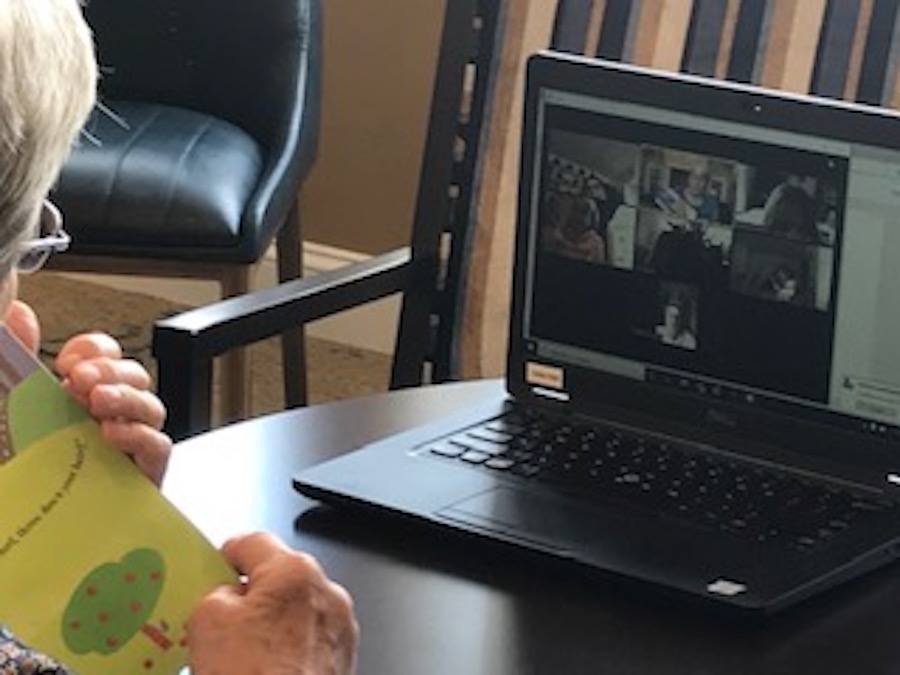
A partnership between the Summit at Glen Mills and the Chester Heights Neighborhood Alliance brings Summit residents and neighborhood children together — virtually — for a mutual story hour every Friday. | This photo and next courtesy Blue Harbor
At the Summit, infotech helps residents and local children engaged with and learning from each other. Blue Harbor has an “Adopt-a-Grandparent” program that pairs local youth with building residents for one-to-one friendships, and the Summit also partners with the Chester Heights Neighborhood Alliance to develop activities that can keep out-of-school kids busy and stimulated. What began as an Easter-greeting exchange has morphed into a Friday-afternoon story hour where residents and kids read favorite stories to each other.
And more. “The kids had all sorts of questions about things the residents told them” at the first story hour, Gittings says. “They couldn’t imagine a pay phone or a party line, for instance.” The story swap was the kids’ idea.
And technology helped Summit staff let residents remain socially connected while keeping social distance on outdoor walks. “Even if we took them outside and placed them six feet apart, they would tend to walk over to each other,” says Gittings. “The problem was not that they didn’t want to follow the social distancing rule. It was because their hearing had been compromised, so if someone says something to them, they can’t hear it from six feet away, so they walk over to the other person. We started to use headsets with mobile devices on the walks, and we made sure they didn’t have their backs facing each other so that if they’re still apart, they could still face each other.”
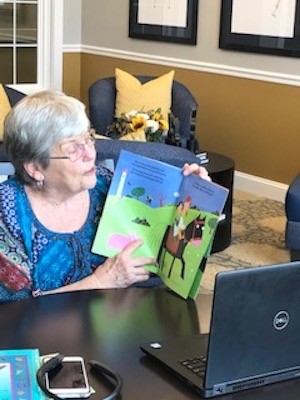
At the Summit story hour, residents and children take turns reading stories to each other.
Keeping prospective residents in the loop. The Summit opened in February of this year, one month before the first of the restrictions set in. Some prospective residents had already put down deposits when Gov. Tom Wolf issued the stay-at-home order that shut down real estate sales and leasing offices. This has led the staff there to use social media and the Postal Service to maintain their interest in the community.
“We’ve been sending items to the depositors — cookies, hand sanitizer, seeds and more,” says Gittings. “The challenge is to keep them engaged, interested and excited, and not to lose the connection we have with them.”
Representatives of Presby’s Inspired Life, which operates three independent-living and more than 30 affordable senior housing complexes throughout the city and suburbs, declined to comment for this article.
Eventually, the stay-at-home orders will pass and life will return to normal for the residents of these communities. Classrooms will fill with residents taking classes, happy hours will move back to the lounges, movies and concerts will take place indoors once again, and residents will gather together over dinner in the restaurants, dining rooms and cafes.
But, as Stefanelli puts it, the residents and staff will have learned and grown much during this time: “Maintaining close connections doesn’t have to mean close physical proximity. We’re assisting residents and families with video calls and other means of communication to keep residents and loved ones in touch, and I know that they will enjoy these newfound skills long after this pandemic is in the history books.”

